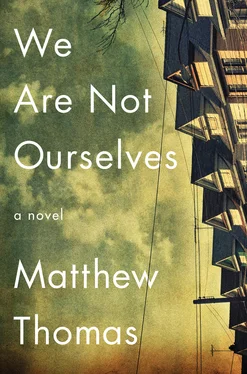Ed said once that when he died he wanted his skull to be used in anatomy classes. He had been delighted by the story of a classically trained stage actor who willed his skull to the company he’d been in, to play the part of Yorick in Hamlet, thereby assuring his immortality.
She took the box down from the closet and set it on her desk. She had never opened it. She lifted one of the cardboard flaps, then another, then the last two, slowly. She shuddered to see the top of that cranium, but she lifted it out of the box and set it facing her on the desk. Despite her years of nursing, her encounters with death, the anatomy classes she’d taken, she’d never been able to shake a basic awe in the face of relics of the body. She sat staring at that empty gaze. The whole time she knew Ed, there had been a skull behind his features. The man whose skull this had been, whose flesh had hidden this bone, had had his own ties of family and friendship. It struck her that she was much closer to the end than the beginning.
She thought of donating it to the science department at Saunders High School, then decided against it. There would simply have to be an orphan skull lying around after she was gone. Connell would find a home for it or take responsibility for throwing it out. He would be the arbiter of its fate, as he would decide what to do with her body, as she had decided what to do with her husband’s, as someone would decide what to do with his.
• • •
The more she thought about Ed’s turning down NYU all those years back, the more she began to entertain other, more mysterious possibilities: that he may have had reasons other than vocation for evading ambition’s prod; that he may have needed BCC more than they needed him; that he may have been afraid of changing his routine or exposing himself to closer scrutiny; that he may have known more than he let on; that he may have known it earlier than she’d ever thought possible.
• • •
The study had lasted three years. She’d kept him on the medicine another two, until it was too hard to get him to swallow the pills. It wasn’t entirely to spite her that he resisted: he had an instinctual fear of choking.
The drug didn’t have a name, just a string of letters and numbers — SDZ ENA 713. Later it acquired a name, Exelon, and could be prescribed. A lot of things were different later. Later they put patches on people so they didn’t have to take pills. That would have prevented a lot of trouble.
She asked herself, when she was feeling low, whether it was the medicine that had caused him to go so rigid that he couldn’t be picked up when he collapsed at the end. Rigidity was one of the side effects. Would she have been able to keep him home longer if she’d taken him off the drugs? Would he have avoided dying in a strange bed?
Sometimes she lay in bed thinking that somewhere they might be making drugs that would have changed everything. She knew she would find that bittersweet, though Ed would be thrilled. Advances in science were the things that made him happiest in life. Advances in science, and Connell. And herself, she had to admit. That was usually when she broke down.
• • •
Many nights, she worked herself into a panic trying to imagine what would have become of him in his last years if she’d divorced him as she’d briefly considered doing before an explanation emerged for his sudden cruelty. Try as she did, she couldn’t picture where he would have lived or who would have taken care of him. As time passed she came to believe that she had been fated to be there for him at the end, that being there for him was what everything in her life — her care of her mother, her career in nursing — had prepared her for, that it was, in a sense, her life’s great work. In this way she was able to sleep soundly again.
This was his final gift to her: to silence her regrets about the paths she hadn’t taken.
• • •
She kept going to the nursing home. She’d grown attached to seeing the other patients. She brought them cookies and sat in the television room with them, watching the evening news or reruns until it was time to go home. Some nights, she read to Mrs. Benziger from a magazine, but mostly she made herself useful by changing the channel when they grew restless with whatever program was on.
One night, as she was leaving, Mr. Huggins came toward her down the hall, pushing his walker. The overhead lights had been shut off for the night, and the only illumination came from a dim table lamp, which, reflecting off his stark white hospital robe, made him look like the herald of some malevolent spirit.
“Hello, Mr. Huggins,” she said as she neared him. He had stopped moving forward and was standing with both hands on the walker. He lifted a hand and pointed at her in apparent remonstration. He was saying something but too quietly for her to hear, so she leaned in closer.
“No more,” she heard him say, gently as a baby. “No more.”
She studied his face to see if he meant what she thought he meant. She couldn’t hear him without putting her ear almost directly up to his mouth, but she could read his lips. He was saying, “No more,” over and over, and he was shaking his head.
It occurred to her that she could elect to take this as a sign if she wanted to. No one was hanging on her decision; it was only her left with her life. Mr. Huggins was right; she couldn’t keep coming here forever. She had needed someone to give her permission to stop.
She kissed his hairy cheek. “Thank you,” she said. “Good night. Good-bye.” She passed through the barrier and out the door, where she stopped to turn and look. The last image she had of the place was Mr. Huggins’s gray-white back, like a glimpse of a surfacing whale, as he stepped in front of the lamp in his slow turn into the room that he had shared with Ed and that now was his alone. She wondered if he missed Ed too. She hoped he didn’t even remember him.
• • •
Everyone told her to sell the house, find someplace smaller, cheaper, sock away the difference. But she didn’t need the money. The life insurance payout allowed her to pay back the home equity loan she’d taken out to cover Connell’s tuition and the nursing home bills. It even let her put the new roof on that she needed. She had little in savings, but she had the house, and she had Ed’s pension and her salary as long as she worked. There was no more nursing home to pay. She wasn’t paying Sergei anymore. Connell was almost done with school.
Besides, where would she go if she sold? Back to Jackson Heights? Nothing was left for her there. When she bought the house, she had planned to die in it. Her plan hadn’t changed.
Cindy Coakley said, imploringly, “The ghost of your former life is here.”
Not my former life, Eileen thought. My former future life. That’s the ghost that’s here. The ghost of the life I almost had. As long as I don’t leave this place, that former future doesn’t have to die.
And then she thought, We move around too much in this country.
Heading into his final quarter of school, which began three weeks after his father died, Connell had only one course left to take in his major. He also needed to finish one science requirement, and he was taking a theater elective, the plays of Tennessee Williams. He had planned to write a thesis on Bellow’s influence on Amis, but he couldn’t get his act together to do so, and he’d stopped caring about graduating with special honors in the department. General honors in the college would do.
Shortly after the start of the quarter, he started dating a girl named Danielle and going to the Tiki or Jimmy’s with her and their friends. He played pool and foosball and Addams Family pinball and had long conversations deep into the night fueled by caffeine, and he had a lot of sex with Danielle. There were people crashing on his couch nearly every night, friends of his or of his roommates, and it felt like a single endless party. He started skipping classes. He still made it to the Blue Gargoyle tutoring center three times a week to meet Delores, the fifth-grader he’d been helping with her reading since September. He started staying in Danielle’s apartment while Danielle was at class. He would be there waiting when she got back, and because she always seemed happy to see him, he didn’t let himself wonder whether he was wasting his time. He worked on his role in Williams’s one-act, Talk to Me Like the Rain and Let Me Listen , a lonely play about a man who comes home to his quietly suffering girlfriend and narrates to her the story of his night spent wandering the streets, which felt quite a bit like his life, except for the part about coming home to his girlfriend, as it was always she who came home to him. His other classes fell to the side. There was a paper he didn’t do in the medieval literature class, and then there was a project he didn’t do in the science class, and then the halfway mark came and went and he knew he was going to fail, but he couldn’t stop himself from failing, and he couldn’t drop any classes because he was only taking three. He knew he was in a whirlpool, and he could feel himself going under, but he couldn’t grab anything firm. His mother wasn’t going to be able to come out for the graduation, because she’d gotten a recent promotion and couldn’t take time off, so he didn’t have to do a lot of explaining about why he wasn’t walking with the others, and it wouldn’t be the worst thing to let her think he had graduated. Danielle was still in her third year. She told him she’d had fun with him and left for a summer in Florence to study Renaissance art. He sold what he could, shipped his books, and got on an Amtrak train in honor of his father, because they had talked of riding the rails across America together. The Lake Shore Limited left at night, passing through Indiana, Ohio, and Pennsylvania before it entered upstate New York. When the sun came up, he saw small cities, former hubs, gorgeous Hudson views. He read a little, didn’t sleep, didn’t talk to anyone. Mostly he looked out the window and thought of his father, who would have found it fascinating, the history of manufacturing in America written on abandoned factories, rusty buildings, heaps of scrap. Somewhere after Poughkeepsie he started crying, and he cried on and off for an hour and half until they pulled into Penn Station. He hadn’t taken this trip intending to mourn his father, but it occurred to him that that was what he was finally doing, that when he’d boarded in Chicago he’d undertaken a twenty-hour vigil of silence for him. It took seeing the haunted glory of upstate New York, and being unable to talk to him about it, for him to understand what it meant that his father was gone.
Читать дальше
Конец ознакомительного отрывка
Купить книгу












